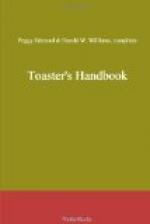The toastmaster, and for that matter everyone taking part, should be carefully prepared. It may be safely said that those who are successful after-dinner speakers have learned the need of careful forethought. A practised speaker may appear to speak extemporaneously by putting together on one occasion thoughts and expressions previously prepared for other occasions, but the neophyte may well consider it necessary to think out carefully the matter of what to say and how to say it. Cicero said of Antonius, “All his speeches were, in appearance, the unpremeditated effusion of an honest heart; and yet, in reality, they were preconceived with so much skill that the judges were not so well prepared as they should have been to withstand the force of them!”
After considering the nature of the occasion and getting himself in harmony with it, the speaker should next consider the relation of his particular subject to the occasion and to the subjects of the other speakers. He should be careful to hold closely to the subject allotted to him so that he will not encroach upon the ground of other speakers. He should be careful, too, not to appropriate to himself any of their time. And he should consider, without vanity and without humility, his own relative importance and govern himself accordingly. We have all had the painful experience of waiting in impatience for the speech of the evening to begin while some humble citizen made “a few introductory remarks.”
In planning his speech and in getting it into finished form, the toaster will do well to remember those three essentials to all good composition with which he struggled in school and college days, Unity, Mass and Coherence. The first means that his talk must have a central thought, on which all his stories, anecdotes and jokes will have a bearing; the second that there will be a proper balance between the parts, that it will not be all introduction and conclusion; the third, that it will hang together, without awkward transitions. A toast may consist, as Lowell said, of “a platitude, a quotation and an anecdote,” but the toaster must exercise his ingenuity in putting these together.
In delivering the toast, the speaker must of course be natural. The after-dinner speech calls for a conversational tone, not for oratory of voice or manner. Something of an air of detachment on the part of the speaker is advisable. The humorist who can tell a story with a straight face adds to the humorous effect.
A word might be said to those who plan the program. In the number of speakers it is better to err in having too few than too many. Especially is this true if there is one distinguished person who is the speaker of the occasion. In such a case the number of lesser lights may well be limited to two or three. The placing of the guest of honor on the program is a matter of importance. Logically he would be expected to come last, as the crowning feature.




